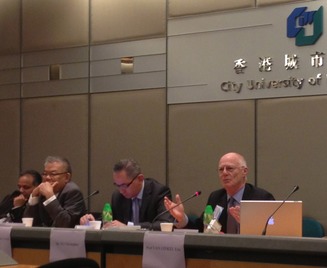ADR Chatroom
Can a med-arb serve in two processes?
Our Spanish face, Laura Lozano writes this month in the Madrid Mediators Association Magazine on the med-arb process focusing on fairness and UNCITRAL, with some recommendations for practice.
Asia-Pacific Mediation Conference 2012 : impact of mediation on national legal systems

Our Hong Kong face, Sala Sihombing attended the two day forum held on 16 and 17 November at the City University of Hong Kong which was organised by the City University and UNCITRAL. Speakers represented all parts of Asia including the PRC, India, Indonesia, Australia, New Zealand, Korea and Hong Kong. Speakers reflected on the ways in which mediation has impacted their national legal systems. Straus's own Professor Eric van Ginkel (pictured above on the far right - with Professor Sharma, Judge Vichai of Thailand and Christopher To) presented on the impact of mediation on the US legal system. Professor van Ginkel ventured where few mediators are prepared to go in his speech and raised issues with confidentiality where it provides a shield for counsel who do not perform adequately and questioned the potential harm that can be done where a mediation agreement is based on fraud or mistake.
Forgiving Our Criminal Offenders
Our Dutch face, Majlie de Puy Kamp writes in the ADR Times about the challenges facing the American criminal justice system and how forgiveness may be the missing ingredient.
Majlie's article is available on the ADR Times at: http://www.adrtimes.com/articles/author/majliedepuykamp
HKIAC consults over new arbitration rules
Our HK face, Sala Sihombing attended a consultation organised by the HKIAC Rules Committee to discuss proposed changes to the HKIAC's Arbitration Rules publicised through a Consultation Paper. Proposed changes include joinder of additional parties, consolidation of arbitrations and emergency arbitrators.
New IBA Rules for Investor-State Mediation
Our Spanish face, Laura Lozano highlights recent developments in investor-state disputes. The International Bar Association (IBA) adopted new Rules for Investor State Mediation the past October 4th. Provided there is written consent to arbitration, investment disputes are normally solved with arbitration. However, it is a reality that state arbitration is getting way too expensive and lengthy[1]. Likewise, amicable settlement methods such as negotiation, conciliation and mediation, are increasingly contemplated in BITs. Therefore, the IBA has wisely adopted measures to increase the use of mediation in investor-state disputes.
Divided into 12 articles, the Rules facilitate the resolution of disputes concerning States and States' entities. For the first time, the process for commencement of mediation is clearly established. Besides, the Rules deal with the appointment of a mediator in the absence of party agreement. Interestingly, the Rules consider the “Mediation Management Conference” for effectively getting the mediation started. And last but not least, the Rules include three Appendices that address the Model Statement of Independence and Availability, the Qualifications for Mediator and the Choice of Mediator though designating authority.
For further information regarding the IBA Rules for Investor State Mediation, please visit the IBA Mediation Committee http://www.ibanet.org/LPD/Dispute_Resolution_Section/Mediation/Default.aspx
[1] The arbitration proceeding in El Paso (ICSID Case No. ARB/03/15) took over eight years. 12 June 2003 (ICSID Registration); 6 February 2004 (Tribunal constituted); 8 April 2005 (hearing on jurisdiction); 27 April 2006 (Decision on Jurisdiction); June 2007 (hearing on the merits); June 2009 (appointment of independent valuation expert); 31 October 2011 (Award).
In Touch with international arbitration
Our Spanish face, Laura Lozano is currently working at the Association for International Arbitration (AIA) based in Brussels. She writes this month in the monthly magazine, In Touch on the new national and international arbitration regime for Colombia and a recent ICSID decision.

